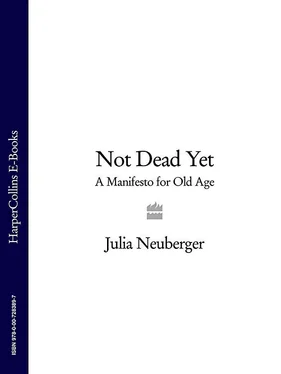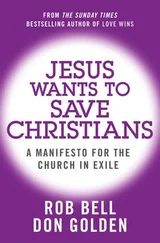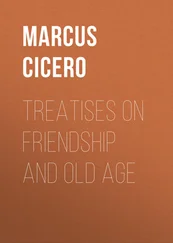A Manifesto for Old Age
Julia Neuberger

Dedication and acknowledgements
I could not have written this book without the extraordinary help and support of Ros Levenson, whose idea it was in part, who conducted much of the research, argued with me, briefed me, and generally helped me make it happen. Nor would it have been possible without the dedicated work of David Boyle, who took an unedited sprawling text and turned it into English – not to mention into manageable prose – as well as arguing through some of it at a late stage, and clarifying my ideas considerably. The team at HarperCollins has been supportive as ever – without Carole Tonkinson, Natalie Jerome, Jane Beaton and Belinda Budge, this volume would never have seen the light of day.
Huge thanks are due to my agent Clare Alexander, as well, dispenser of wise advice, firm encouragement, superb ideas, and lots of wine and sympathy, and to my assistant Paola Churchill, referred to by my whole family as ‘my boss’, because she tells me what I have to do, including finishing this book.
But this book would not have been possible without the help and support in quite other ways of my beloved parents, Walter and Liesel Schwab, wise to the end, whose old age I lived through with them and for them, of my uncle, Harry Schwab, and of my mother-in-law, Lilian Neuberger, who aged with astonishing grace and died at 94 whilst this book was in preparation. So Not Dead Yet is dedicated to their memory, as well as to my thoroughly alive and feisty aunt Anne Schwab, who is busy proving how effective you can be in old age – a lesson to us all.
When I was eighty-seven
they took me from my coffin;
they found a flannel nightshirt
for me to travel off in .
All innocent and toothless
I used to lie in bed,
still trailing clouds of glory
from the time when I was dead .
The cruel age of sixty-five
put paid to my enjoyment;
I had to wear a bowler hat
and go to my employment .
But at the age of sixty
I found I had a wife.
And that explains the children.
(I’d wondered all my life.)
I kept on growing younger
and randier and stronger
till at the age of twenty-one
I had a wife no longer .
With mini-skirted milkmaids
I frolicked in the clover;
the cuckoo kept on calling me
until my teens were over .
Then algebra and cricket
and sausages a-cooking,
and puffing at a cigarette
when teacher wasn’t looking .
The trees are getting taller,
the streets are getting wider.
My mother is the world to me;
and soon I’ll be inside her .
And now, it is so early,
there’s nothing I can see.
Before the world, or after?
Wherever can I be?
‘Run the Film Backwards’, Sydney Carter
Introduction Not Dead Yet A Manifesto for Old Age Julia Neuberger
Run the film backwards Not Dead Yet A Manifesto for Old Age Julia Neuberger
It is a stabbing irony that as we become an elderly country we ignore the elderly with ever greater ferocity: if you don’t look at the Ghost of Christmas Future, maybe it will never come .
Johann Hari, Independent, 19 January 2006
Dove contacted the manager of the sheltered accommodation where I live in Stoke Newington to see if there was anyone suitable. He told them about me and the casting director came round, but when I answered the door she pushed past and said, ‘Is your mother here?’ She didn’t believe I could be 96 … I was in Paris a fortnight ago, posing for a fashion magazine. Can you believe it?
Irene Sinclair, 97, the face of Dove soap
I am an only child, and I cared for both my parents as they got older and frailer. First, it was my father, though my mother did most of the caring, and talked constantly about how it was always the women who did the caring, and the women who were left behind. Later on, after my father’s death, I cared for my mother, by then exhausted after looking after my father as he became sicker and more difficult. She had five more years as a widow, most of that time in extreme ill-health.
My experience – and that of countless friends and acquaintances – emphasizes both the best and the worst of caring for older people, and the way they are treated. It also makes it clear, if anyone had any doubts, that my mother was right. Benjamin Franklin first said: ‘All would live long but none would be old’, and he was right too. Or, as my mother put it: ‘Don’t get old – it’s not much fun.’
There were good reasons why her final years were difficult. She was suffering from a rare chronic disease called Wegener’s Disease, so rare that neither she nor I had ever heard of it before. As she became more infirm, she was very impatient about what she could no longer do. She became impatient with not being able to go back to work, feeling that her life now meant little. Certainly my mother was well cared for, and said so repeatedly. She even left us a letter saying so after she died. Yet she was miserable, felt superfluous, and could see no role for herself. This feeling seemed to be only partly linked to her health. She was very active and had large numbers of friends, but she still felt superfluous. Neither her friends, nor her grandchildren, nor her wider family were quite enough.
After she died, thinking over these things, I began to worry a great deal about the kind of society we have become, that allows older people to feel so miserable even when we try to provide all the care that they can need. It began to make me angry when I realized that she had been affected by the prevailing cultural view of people being old. She really felt, somehow, that she wasn’t being noticed.
If that was the case, she didn’t say so exactly. She kept saying that she had to go back to work. She had worked all her adult life, until she was 70. After that, she did a little bit of dealing in pictures, and was never somebody who did nothing. She seemed to feel, because she did not ‘work’ in the conventional way, that she had become a non-person. My experience since suggests that this feeling is very widely shared.
As the time passed after my mother died, the questions nagged away at me. I chaired an NHS trust that worked a great deal with older people, and – although the care was generally good – I found myself asking why older people’s care had to be separate from other people’s care. Of course older people tend to have multiple chronic issues, and there might be reasons why these should be treated together. Yet, in many parts of the UK, you get better care if you have a stroke when you are young than when you are old. There really is no excuse for that. It suggests that we think that lives are worth more when you are younger.
Also, why should my mother have felt so sidelined by society? Older people often used to feel they had an important role. They were the wise in society, the imparters of knowledge and experience to grandchildren. They provided stability in families that were troubled, and were often the carers of even older people, as well as being providers of comfort to those who were in pain or discomfort themselves. Other societies claim to maintain that role for older people. Some even manage it, some of the time, for some older people. But in modern Britain, those days seem to have gone completely. For my mother to argue that she wanted to return to work at the age of 82 means that she could not see what else there was for her without conventional paid work, in a culture that is increasingly obsessed with work.
Читать дальше













